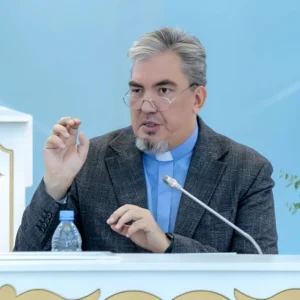Knowing each other erases fear—yet in today’s world, unfamiliarity too often breeds misunderstanding. Stereotypes and assumptions shape how we perceive people of other faiths, especially in the realm of religious identity. But fear, at its root, stems from ignorance. That’s why Love Your Neighbor Community (LYNC) prioritizes cross-cultural and interfaith engagement: to foster genuine understanding between Christians, Muslims, and people of all faiths. Through programs in Central Asia, LYNC is helping break down these barriers—one relationship at a time.
Knowing Each Other Erases Fear | Overcoming Religious Stereotypes
We live in a world of stereotypes. Stereotypes shape our attitude to many things. Very often, in matters of attitude to unfamiliar things, we rely on the opinions of acquaintances, on the opinions of famous and lesser-known people, on the opinion of society. However, stereotypical thinking does not always reflect objective reality and the situation.
It seems that stereotypes are born for many reasons. However, one important reason that influences the formation of stereotypical thinking can be identified. And this is ignorance or lack of knowledge, an incomplete understanding of people and things. Ignorance, in turn, is the result of fear of the unknown, unwillingness to learn and change one’s usual understanding, and sometimes the result of high self-esteem and proud prejudice towards the unfamiliar and unknown.
The sphere of religious relations has never been an exception regarding stereotypical perception. Our stereotypical thinking draws pictures of various kinds in our imagination, often completely unfavorable, in relation to representatives of other religions. And again, ignorance and incomplete understanding of a religious worldview different from yours play a huge role in such an attitude.
The LYNC (Love Your Neighbor Community) organization has always set one of its main goals as promoting interreligious understanding in modern society. LYNC achieves such understanding using the principles of covenant pluralism, when representatives of different religious traditions, despite differences in doctrines and practices, can develop good neighborly, healthy relationships regardless of their theology.
Thus, several events, round tables, and trainings were held in Kazakhstan in 2024 with the participation of LYNC, where representatives of different religions could meet each other, talk about their values, discuss “difficult issues”, share expectations, talk about developing relationships, and just be friends. As a result, friendly relations began to appear between spiritual leaders, religious leaders, and representatives of Islam and Christianity. This, in turn, began to affect the relationship between these religious communities favorably.
Of course, our country still has a long way to go towards interreligious understanding. But the first step has already been taken, and a good foundation for building good neighborly relations has already been laid. Ignorance gives rise to fears and stereotypes. As one of the pastors of the city of Almaty said about relationships between Christian and Muslim leaders: “When we get to know each other, we stop being afraid and avoiding each other.” We hope that the projects carried out by LYNC in Kazakhstan and Central Asia, the seed that was sown in the hearts of the leaders of religious organizations in Kazakhstan, will grow into strong relationships, despite religious differences.
About the Author

Arman Arenbayev was born in 1976 in the Soviet family of university teachers. When Arman was in high school, the Soviet Union collapsed and after the fall of the Iron Curtain, religion became available in the country. Arman became a believer after hearing the Gospel in 1992. In 1999, he graduated from the Geography Department of Kazakh State University (KazGU) and received a master’s degree in geography and geomorphology. From 1998 to 1999, he worked in the Ministry of Environment and Natural Resources of Kazakhstan. Since 1999, he worked in the Christian Organization CRU and in 2011 he became the senior pastor of the Presbyterian Church “Almagul”. Currently Arman serves as chairman of the Association of Reformed Churches of Kazakhstan. Married (Marina) , three children (Arthur 17, Amir 14, Mia 9).


Join in on the conversation